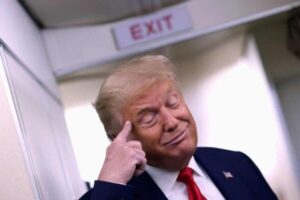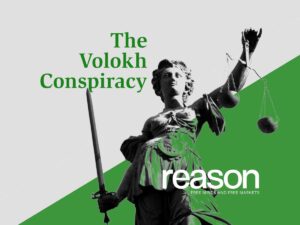[ad_1]
From Wednesday’s resolution in Libertarian Nationwide Committee, Inc. v. Saliba, by Sixth Circuit Decide Julia Smith Gibbons, joined by Judges Man Cole and Chad Readler:
This trademark motion arises out of a dispute inside the Libertarian Celebration of Michigan (referred to by identify or because the “Michigan affiliate”). The Libertarian Nationwide Committee, Inc. (“LNC”) sued dissenting members of the Michigan affiliate—primarily former officers of the affiliate or board members of native events—for utilizing the LNC’s trademark to carry themselves out because the official Michigan affiliate after a turnover of energy resulted in two factions claiming to carry energy.
The district court docket granted the LNC’s request to preliminarily enjoin the dissenting members’ use of the mark, and the dissenting members appealed. They argue that the district court docket’s software of the Lanham Act to the context of noncommercial speech each unduly expands the Act and violates the First Modification. Even when the Lanham Act covers the dissenting members’ use of the trademark, they argue that their use was licensed and never prone to trigger confusion [details on this omitted -EV].
The circuit court docket largely agreed with the district court docket, concluding that trademark legislation could permissibly prohibit complicated makes use of of one other entity’s identify as “designat[ing the] supply” of speech, items, and companies, even in political speech somewhat than business promoting:
In Taubman Co. v. Webfeats (sixth Cir. 2003), this Circuit addressed using a shopping center’s trademark in domains by the creator of a “fan web site” and, after the connection between the events soured, a gripe web site for that mall. The web site creator contended that his goal for utilizing the mall’s trademark in his web sites was expressive somewhat than business, and thus outdoors of the realm of the Lanham Act and guarded by the First Modification. In combatting the defendant’s allegation that the Lanham Act conflicted with the First Modification, the Taubman Courtroom reasoned that the Lanham Act is constitutionally sound “as a result of it solely regulates business speech, which is entitled to decreased protections beneath the First Modification.” …
In explaining why the defendant’s use of the mall’s mark was protected expression, the Taubman Courtroom expounded that the defendant used the mark to touch upon the trademark holder—not “to designate supply.” Jack Daniel’s Properties, Inc. v. VIP Prods. LLC (2023). In different phrases, the defendant didn’t use the mark to move off the products or companies marketed on his web site as these of the shopping center.
Since Taubman, the Supreme Courtroom has defined how the Lanham Act and the First Modification work together when a defendant makes use of a trademark to misrepresent his or her items or companies as these of or related to the trademark proprietor. Simply final 12 months, the Courtroom famous that the place a defendant makes use of a trademark as a supply identifier, “[t]he trademark legislation typically prevails over the First Modification.” Jack Daniel’s Properties. It’s because use of a trademark as a supply identifier undermines the first operate of trademark legislation, which is to forestall “misinformation[ ] about who’s liable for a product” or service. Such is true even the place the defendant’s use of the mark additionally conveys an expressive message. Cf. San Francisco Arts & Athletics, Inc. v. U.S. Olympic Comm. (1987) (“The mere incontrovertible fact that the [nonprofit defendant] claims an expressive, versus a purely business goal doesn’t give it a First Modification proper to acceptable to itself the harvest of those that have sown.”). In that circumstance, “the likelihood-of-confusion inquiry does sufficient work to account for the curiosity in free expression.”
We take this chance to make clear that Taubman‘s language limiting the Lanham Act’s protection, whereas implicated the place a defendant makes use of the mark purely for protected expression, like satire, critique, or commentary, doesn’t prohibit software of the Lanham Act to a defendant who makes use of the trademark to establish the supply of his or her competing items or companies. As a result of the defendants right here used the LNC’s trademark to talk as the Libertarian Celebration of Michigan, defendants used the mark to designate the supply of their political companies as affiliated with the LNC, thus implicating “the core issues of trademark legislation” and rendering Taubman inapposite.
Defendants resist this conclusion by emphasizing that Jack Daniel’s Properties contemplated trademark infringement within the context of business merchandise—a context through which trademark legislation historically and comfortably operates. True, trademark legislation was designed to fight potential shopper confusion and the theft of the trademark proprietor’s goodwill within the context of business gross sales. And we acknowledge that outdoors of the details earlier than us, speech rendered in reference to the supply of political companies usually constitutes political speech awarded heightened safety beneath the First Modification. However we discover assist in Jack Daniel’s Properties for our place that, within the slim context the place a defendant makes use of the trademark as a supply identifier, the Lanham Act doesn’t offend the First Modification by imposing legal responsibility within the political area.
Whereas explaining why a predicate First Modification check, somewhat than bizarre trademark scrutiny, doesn’t apply when a defendant makes use of a trademark as a supply identifier, Jack Daniel’s Properties cited a case remarkably just like the case at hand.. In United We Stand America, Inc. v. United We Stand, America New York, Inc. (second Cir. 1997), the Second Circuit contemplated a trademark infringement motion by United We Stand America, Inc., which owned the slogan, “United We Stand America.” After friction inside the group, the defendant created an offshoot political coalition, “United We Stand, America New York, Inc.” which additionally used the slogan to have interaction in political actions.
The Second Circuit deemed the defendant’s trademark use inside the scope of the Lanham Act and outdoors the safety of the First Modification as a result of the offshoot group used the trademark “as a supply identifier” for the group’s political companies somewhat than to pose “commentary on [the trademark’s] proprietor.” Accordingly, such use subjected the defendant to Lanham Act legal responsibility although the offshoot coalition “may talk its political message extra successfully by appropriating [the trademark].”
The Supreme Courtroom cited United We Stand with approval of the Second Circuit’s resolution to use bizarre trademark scrutiny although the defendant’s use of the slogan additionally “had expressive content material.” Jack Daniel’s Properties. As a result of the offshoot political coalition used the trademark “to counsel the ‘similar supply identification’ as the unique ‘political motion,'” such use was not insulated from Lanham Act legal responsibility. Id. (quoting United We Stand, 128 F.3d at 93). We discover the Supreme Courtroom and the Second Circuit’s reasoning persuasive. Specializing in using a trademark as a supply identifier adequately accounts for the core pursuits undergirding trademark legislation with out “suck[ing] in speech on political and social points by some strained or tangential affiliation with a business or transactional exercise.” Radiance Discovered., Inc. v. N.A.A.C.P., 786 F.3d 316, 323 (4th Cir. 2015). Thus, within the slim context earlier than us, the place a defendant makes use of a trademark as a supply identifier, we discover the extension of the Lanham Act into the political sphere acceptable.
Defendants subsequent contend that, as a political entity, they don’t render the kind of companies included within the scope of the Lanham Act. Accordingly, they argue, their use of the LNC’s mark in reference to these companies will not be prohibited by the Lanham Act. A “service” is an “amorphous idea, ‘denot[ing] an intangible commodity within the type of human effort, reminiscent of labor, talent, or recommendation.'” As defendants used the LNC’s trademark to promote a political conference, function a web site, promulgate political information and get together actions, file marketing campaign finance reviews, endorse candidates, and solicit donations, they “unquestionably render[ed] a service” contemplated by § 1114(1)(a). United We Stand (discovering “companies characteristically rendered by a political get together to and for its members, adherents, and candidates,” like political organizing, sustaining an workplace, endorsing candidates, and distributing partisan materials to be “companies” beneath the Lanham Act)…. [T]he First Modification tolerates the Lanham Act’s interjection to forestall use of a trademark as a supply identifier in a fashion that creates confusion as to the supply of the defendant’s political companies.
{ The district court docket clarified that the injunction merely prohibits defendants from figuring out as the Libertarian Celebration of Michigan within the provision of companies, it doesn’t stop them from figuring out as members of the Libertarian Celebration or the Michigan affiliate, or from utilizing the trademark to criticize or touch upon both entity. We emphasize once more that the Lanham Act doesn’t prohibit defendants’ means to have interaction in political speech. It merely restricts defendants from utilizing the LNC’s trademark to establish as the Libertarian Celebration of Michigan in reference to offering or promoting their very own political companies.}
“If totally different organizations had been permitted to make use of the identical commerce identify in endorsing candidates, voters could be unable to derive any significance from an endorsement, as they might not know whether or not the endorsement got here from the group whose aims they shared or from one other group utilizing the identical identify.” United We Stand America. Thus, we agree with the district court docket that defendants’ use of the LNC’s trademark in reference to the supply of competing political companies created a excessive probability of confusion for shoppers, i.e., potential voters, get together members, and, within the case of solicitations not accompanied by a transparent disclaimer, donors.
Defendants’ use of the “Libertarian Celebration” mark meant that two totally different entities concurrently held themselves out because the Libertarian Celebration of Michigan. A possible voter visiting defendants’ web site wouldn’t be capable of inform if the platforms defendants espoused or occasions they marketed had been really affiliated with the Libertarian Celebration. Given defendants’ use of the LNC’s precise mark within the provision of competing political companies to the identical goal inhabitants, such threat is at play right here. And this threat will not be hypothetical—the LNC submitted a minimum of some proof of precise confusion concerning the sponsorship of competing conventions. This probability of confusion is adequate to assist a Lanham Act declare.
Defendants additionally used the LNC’s trademark on their web site to solicit donations. In reference to the donation tab, defendants displayed considered one of two pop-up disclaimers notifying the potential donor of the governance dispute, the LNC’s recognition of the Chadderdon-led faction, and that any donations could be going solely to defendants. The disclaimers additionally included hyperlinks to the Chadderdon-led affiliate’s web site. By clearly explaining the id of the donation recipient, these disclaimers ameliorated the confusion the Lanham Act seeks to forestall. The disclaimers additionally resemble these we now have beforehand discovered adequate to get rid of a probability of confusion. Accordingly, defendants’ use of the trademark in reference to their on-line solicitation of donations, when accompanied by acceptable disclaimers, doesn’t create a adequate probability of confusion as to the recipient of the funds and thus can’t be the predicate for Lanham Act legal responsibility….
We affirm the preliminary injunction granted besides as to defendants’ on-line solicitation accompanied by clear disclaimers.
Joseph J. Zito (DNL Zito Castellano) represents the plaintiff.
[ad_2]





